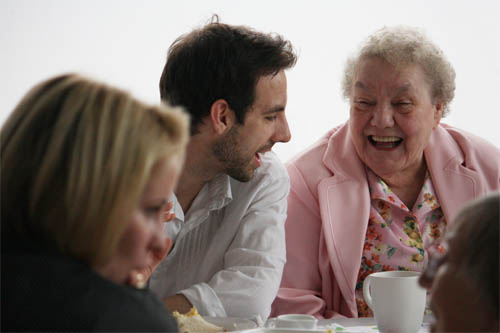Doing what really matters in social care in Wales - how do we make it happen together?
Measuring the Mountain conducted two Citizens' Juries - one in September 2018 as an in-person event and one in September 2020 as an online event. The first one looked at what really matters in social care, and the second moved the discussion on to look at how we can make that happen together.
Both Juries brought together 14 members of the public (different groups each time) to listen to information from a series of expert speakers, and at the end of the process they produced a number of recommendations - 15 in 2018, and 16 in 2020. You can read more about both events below.
Citizens' Juries are a well-established approach to involving the public in policy and decision-making debate (Dr Rachel Iredale, our Principal Investigator explains all in this video). The work of our incredible Jurors at both events demonstrate the enormous value of engaging meaningfully with people and of taking the time to work with people to really hear and understand their views.
You can watch all of the sessions from the 2020 Citizens' Jury on our YouTube channel.
Citizens' Jury 2018

We ran our first Citizens' Jury in 2018, looking at what really matters in social care. Our Jurors spent three days listening to information from 22 speakers, asking them questions and really getting to the heart of matters.
The programme we put together reflected key themes and issues that had arisen from the story-gathering phase of the project. It highlighted exemplar practice and also offered the Jurors an opportunity to learn more about the day-to-day experiences of people who use care and support services, and those who are unpaid carers.
On the final day our Jurors identified a series of 15 recommendations they wanted to make. These related to critical aspects of social care delivery including ease of access to information, good support unpaid carers, enhanced support for social care professionals and commissioning processes.
These recommendations were presented to Welsh Government who accepted 14 of the 15 and partially accepted the 15th (see below).
Citizens' Jury 2020
.jpg)
***Visit our YouTube channel to watch the sessions in full***
The 2020 Citizens' Jury built on the work from 2018, and moved the discussion on to look at how what really matters in social care can happen. The programme featured a diverse range of speakers and the sessions are an incredible opportunity to learn more about:
• Innovative services – how they came about and why they work
• How different organisations responded to the pandemic
• What day to day life is like for people who are unpaid carers and for those who use support services
• The priorities of the public as the Jurors ask questions and get to the heart of matters.
On the final day, our Jurors produced 15 recommendations that include establishing a Disabled People's Commissioner, creating a task force to explore Universal Basic Income and improving representation at all levels of social care.
What next?

The report from the 2020 Citizens' Jury was submitted to Welsh Government in December 2020 and a formal response to this work is anticipated in summer 2021.
All the sessions from the Jury are available to watch on our YouTube channel. They contain huge amounts of information, ideas and discussion – please share them and make use of them in your own work.
Alongside these sessions sit the 15 recommendations made by the Jurors that outline key priorities, as identified by them, in their capacity as a representative group of citizens from Wales.
Our hope is that organisations take inspiration from these recommendations and find ways to develop their practice to support more and more people who are unpaid carers, and who use care and support services, to have positive experiences.